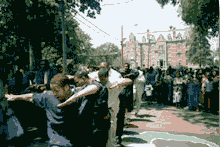 |
 |
 |
|
|
||||||||||||||
|
|
||||||||||||||
| Email Article | Printable Page |
Maybe It's Time for Black Greeks to Disband
 |
| Ricky Jones |
A couple of weeks ago, one of my favorite former students — now an administrator at Fisk University — called to inquire how quickly I could get Fisk on my speaking schedule. He informed me that my fraternity brothers on the campus had become the latest victimizers responsible for the hospitalization of a young man attempting to join a black fraternity. In response to this and other concerns, Fisk's administration had placed a moratorium on initiation for all its Greeks for a year. "We need you down here, Doc," my old student said, "Maybe you can get through to some of these people."
Unfortunately, like many schools, Fisk waited until someone was badly injured or killed to call. This is not to say the fault totally lies with the schools touched by the scourge of hazing. To be sure, there is enough blame to go around. In fact, as the number of young black men and women injured in pledging/hazing rituals continues to mount, it is time to place the lion's share of the blame on the people who commit these crimes and the groups that house them — black Greeks themselves and the organizations to which they belong.
 |
|
Photo credit: Fisk University
Fraternities at Fisk won't be allowed to throw parties or recruit new members in 2004-05.
|
The fact that hazing continues at a steady clip is evidence enough that black Greeks' national headquarters either do not want to stop the practice or do not know how. I would hope the latter is closer to the truth. Certainly, there is also the possibility that pledging — and the hazing that invariably accompanies it — cannot be stopped at all. All of these options lead us to disturbing realities, which must be faced before more of our students are hurt physically, damaged psychologically or even killed.
Even though Greekdom admittedly has positives, many of today's members have degenerated into dangerous, narcissistic near-sociopaths where the preservation of their rite of hazing is concerned. This is simultaneously a simple and difficult admission. We would be hard-pressed to find someone who would not admit that the violence, damage and death visited upon young people like Joel Harris at Morehouse in 1989, Michael Davis at Southeast Missouri State in 1995, Shawn Blackston at Louisville in 1997 or Kenitha Saafir and Kristin High at California State University in 2002 is wrong. Regardless of this, there is an almost immediate attempt by many Greeks to convolute the issue by shifting blame and refusing to take responsibility for their personal involvement in similar violent activities.
When crimes are committed in these organizations, a project is mobilized that is almost totally dedicated to the survival of the chapters. It is often marked by the use of blatant lies and the deception of other members, educational officials and legal authorities. The ploys are often successful, not because they are well thought-out or believable, but because many of the investigators historically have seemed to tacitly condone the actions of the Greeks or do not really care whether groups of black folk beat one another to death. The deceptions and those who allow them must be stopped.
At this historical moment, we must unapologetically take the stance that the mission and meaning of black Greekdom can only be respected and needed insofar as it speaks to the progress of the ongoing black humanization project in general. If some members of the community now hold Greeks in disdain, there is a reason why. The oft-encountered Greek perspective, that many non-Greeks criticize them completely out of ignorance and jealousy, simply does not hold under rational analysis.
Let's be real — at this point in the game, everybody knows this behavior is wrong, immoral and illegal, yet many Greeks continue to engage in it. In the face of this reality, local and national Greek officials must now publicly address not only what they are doing right, but also what they are doing wrong. If they are unwilling to do this on their own, drastic measures may need to be explored. As a longtime Greek, it pains me to say it, but if these people can�t stop themselves, maybe it's time for us to at least consider the possibility that the only way to stop them is to disband these groups. Sadly, nothing else has worked.
Posted Nov. 1, 2004
In Voices
It Was Surreal in Jena, 45 Miles from My Hometown
Before Condemning Michael Vick, Consider Ignorance, Stupidity — and Insanity
| Home | News | Sports | Culture | Voices | Images | Projects | About Us Copyright © 2007 Black College Wire. Black College Wire is a project of the Black College Communication Association and has partnerships with The National Association of Black Journalists and the Robert C. Maynard Institute for Journalism Education. |